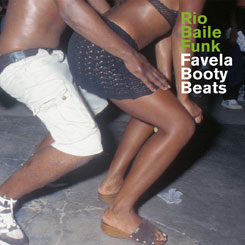Stirring the Pot
Timo (aka DJ Rideon) was kind enough to big up my mix A Seleção do Gringo on the Rio Baile Funk blog. But he raised some questions about my admittedly ad homonym (or at the very least sneaky linky) digs at some of my fellow "funky mediators." I expected as much and he's fair to call me out on my URL trickery, so lemme explain:
Diplo -- I've been writing about funk&Rio, among other sounds&cities, for going on a year and a half, but I've largely avoided mentioning Mr. Pentz, whose shadow certainly looms large over the crowd of gringos who've gone south. I have to admit that back in the spring of '06, I was still easing my way into the heady world of int'l sounds, c/o knowledge jewels like Music E-145 (and hey, now I'm the TA!). And it was via Diplodocus that I, like many who live above the equator, first heard of Rio's booty beats. Not that there weren't contemporaries or even precursors -- cf DJ Philomena and the unfortunately-named Slum Dunk Presents Funk Carioca (in part orchestrated by Tetine, who claim the equally unfortunately-named album L.I.C.K. M.Y. F.A.V.E.L.A.)
But I'm definitely of the opinion that some of his early efforts at popularizing the genre were problematic.

Favela On Blast / Favela Strikes Back / Piracy Funds Terrorism

This mixtape triptych from '04, when funk was the hottest thing in the Diplo repetoire, is shockingly disrespectful to the music he was building a reputation on (not to mention the cavalier use of "favela"). All three do not credit any tracks with artists or titles, and in Piracy Funds Terrorism, tracks named "Baile Funk 1" "Baile Funk 2" &c brush up with properly credited MIA mash-ups and dirty south hits.
Why are funk MCs less important as artists than The Clipse?
I'll grant that o movimento funk itself is not known for its scrupulous organization, and plenty of mixtapes you pick up in Rio are creditless too. But it's not like Favela On Blast is chock full of hardcore proibidão (where anonymity is the order of the day) -- it's got mainstream funk hits like Bonde do Vinho's "Labarinto vs. Vem Cá Nenem" (popular here too for using a "Rock the Casbah" instrumental) and one of the many remixes of the Flamengo anthem (both of which are on Seleção do Gringo, properly credited).
Timo points out that I, too, have some uncredited tracks in my mix -- but I tried to avoid them (they are the exception, not the rule) and at the very least I explain why I don't have the info, even after some hunting around Google Brasil.
A review of Favela Strikes Back ultimately argues that such culture vulture moves may not be so bad if, in turn, they translate into $$ (or more precisely R$R$) in the hands of artists, although the review itself really flounders with terms to describe the music (hardly an unknown occurrence outside their indie rock bread and butter). Difficult questions about favela economics (will it just lead to more gringos buying drugs?) and commodification aside, I agree that Diplo and early funkeiros up north certainly paved the way for DJ Sany Pitbull, DJ Sandrinho, and MC Dudu do Borel (among others) to bring the funk direct without relying on such mediators. But how much of a north-south reversal are they making if Sany ends up playing at a place called Favela Chic, which could easily happen the night after he plays the baile funk in the favela of Cantagalo (which in turn I've heard called "baile chique" because of the number of well-heeled cariocas that have been coming up for the party)? And of course, it's only a select class who are making the leap outside of their communities, much less Rio. Trickle-down economics definitely don't apply.
This is, of course, dating back a few years, and I applaud more recent efforts like HeapsDecent and the Favela On Blast film (which could go either way) as making up a little bit for past transgressions.
It's a question if he can really focus long enough on these projects to make sure they come to fruition properly. As Wayne&Wax has already pointed out, move too quick and you'll miss the details.
[After delivering a similar argument in a Music E-145 guest lecture two weeks ago, I copped Soy Cumbia!, a MadDecent podcast mix that is mad indecent -- BsAs champ Sonido Martines loses remix credit and rumor has it that vocal drops and shout outs (y'know, local color, marks of identification) were cut from the beginning of the tracks. Just go listen to Sonido on RuptureRadio . . . he spends a lot more time in BsAs than Philly's finest.]


Essay/Man Recordings: As an acknowledged commercial success with two hit compilations, it might just seem like a case of jealousy. But I think these comps were another opportunity squandered -- the cropped mid-sections of the first cover replicating the same anonymous-as-exotic canard of Diplo's mis- or non-labeling. I feel better about the more recent Funk Mundial and Baile Funk Masters series, as they actually draws distinctions between different DJs and MCs, their personalities, the styles they bring to the table. Funk is not monolithic in this format, and that's a big improvement. Still, as recently as this summer, an MC I'm friendly with who ended up on this release said the contract presented to her was in English and explained to her by a (European) bilingual friend of Man's man on the ground, Daniel Haaksman, who in turn is still struggling through his Portuguese ABCs. I'm really shocked that after so many releases, they haven't gotten their act together enough to find a Brazilian lawyer and draft a contract in the lingua franca (or just have a notário do a certified translation). I haven't seen the contract, although I offered to look it over, so I don't want to claim that it was misrepresented or offers poor terms, but the fact of it still strikes me as a disservice.
CokeGunsBootyBeats: My favorite example of hyper-sensationalized funk coverage. This guy Alex Bellos, "reporting deep from the slums of Rio de Janeiro" like a modern-day Livingstone, has produced one of the most telling statements in English-language press about o mundo funk carioca. "Welcome to the most exciting--and the most dangerous--underground club scene in the world." The real message here is that it's the most exciting because it's the most dangerous. The interest of Bellos ("a world expert on Brazil" ?! -- stick to futebol) and his readership is fueled by an image -- even a fantasy -- of drug- and violence-infested third world slums populated by 12 year olds snorting cocaine and holding AK-47s. Does proibidão, the focus on Bellos' article, revolve around the culture of drug trafficking in Rio? Of course. But it doesn't require such preposterous reporting, cf Machine Gun Voices.
___
All of which makes me appreciate all the more the kind of approach engendered by the Blogariddims series. I realize I'm comparing apples to oranges with a podcast stacked up against record label releases, mixtapes, journalism, and well, another podcast. But there's room in each to show a little more care (and interest -- is it about you or the artists you're bringing to another audience?) w/r/t cross-cultural contact.
Moral of the story: If the world were more like Blogariddims, maybe it'd be a more ethical place.

Labels: blogariddims, BsAs, cumbia, ethics, funk, podcasts, rio

6 Comments:
Greg, I´m really getting mad about the blasé academic paternalisation you are presenting on your blog analyzing my work. You obviously never dealt with the problems that it takes to officially release a baile funk track in terms of clearing licenses, communicating with Rio based labels and artists. It is, to be honest, a nightmare. And it´s the most difficult thing for a one man, indepent label like mine to present services that majors can present because they got the money to pay the translation of contracts or to employ their own lawyers. So you shouldnt be shocked that I still didnt get my act together – it´s just part of the reality running a mini label that is not backed by major money but only by pure hard work. If I would make thousands of Euros with baile funk, I certainly wouldve employed someone to translate the contracts – but I hardly break even with my releases and I´d rather spent the 300 Euros it takes to translate a legal contract on a remix fee for a Rio DJ than on some paper work – which is non relevant to most of Rio artists anyway But I dont have any hard feelings anyway as all contracts that I present are 100% cool and treat the artists with respect and dignity. Every artist I release gets sample copies of his release, for every record I press I pay to the collecting societies, I even pay the artists an upfront cash advance for their performance, and when their acappella is used they even get a publishing advance which in these heavy days for the music industry is a rarity - even for major labels. So stop talking like you know how things are dealt in Rio – coz you obviously dont have a clue from the music industry practice it takes to release this kind of music on a legal level. Instead of dissing me as soemeone that is struggling through his Portugese ABC you should take a closer look at things that are beyond your university world. By the way, I speak Italian so I do understand Portugese very well. So cut the crap!
The most disavowing aspect in your argumentation however is at the very end of your „analysis“: „:If the world were more like Blogariddims“, there would me more room to show „care“. Great! As if audio blogs financially or logistically support in any way the artists or labels from which they get their music from. Ok, they can show cross-cultural-contexts, yeah, because they dont have to deal with any kind of legal procedures! But do you pay any license fees for your podcast to the musicians you present? Does your Podcast mix allows Deize Tigrona to get any kind of international booking ? Do you go to Rio twice a year to visit, live and work with the artists you are paternalising in your blog? I don´t think so. Please, next time before you judge my work, think about exactly this: „move too quick and you´ll miss the details“
Whats your take on dJ Marlboro's long-running radio + record monopoly? Diplo was the white american dude who first started exploiting the funk scene, but Marlboro has had the scene on lock for a decade b4 Dip even showed up
Hey Greg, interesting points all over here but, even though I agree on Wayne's prudent don't go too fast, I feel it was important at the time to maintain a good amount of releases in order to keep general and media attention on this music. And I feel it's the same these days.
Also from what I know, Man Recordings is actually one or two people, who are navigating in a not so easy business. Releasing cds these days is kinda a financial suicide and releasing music from a still pretty far away country, with people you have difficulties to understand is an important challenge. Basically what I'm saying is it might not be so easy to do what you're suggesting them to do with the money I believe they most probably barely have. Did I mention the trips there? I mean it's super hard to earn a living in the music business, even more in such a "niche". So I'm not sure about your reaction on that episode, that in my humble opinion would require a more economically "comprehensive" approach especially when you didn't see the said object.
As for the Favela Chic, If you don't know them I would say, don't judge a book by it's cover and maybe visit www.clekcleckboom.com which has been launched a few weeks ago by one of the resident dj of the said venue alongside with Sandrinho.
Guillaume aka another mediator
Daniel,
To the contrary, I actually have dealt with the problems of putting funk on a commercial release.
I've been working on a CD compilation for almost a year and a half now with Flamin Hotz Records -- they once released a bootleg EP and when I got in touch with them they (or really he -- it's another one, sometimes two-man operation with no major financial backing) asked if I would help out on a more legit project -- both financially (contracts, advance payment, royalties, etc) and in terms of presentation (bios, translated lyrics, etc). And having spent some time in Rio and benefitted from the considerable generosity of a lot of folks, it seemed like something worth pursuing -- of course making a podcast won't put money in someone's pocket, but if someone likes certain tracks in the mix, maybe they'll want to buy it mastered on a vinyl promo (look for in a few weeks) or the CD (slated for February). I'll be sure to point them in the right direction when they're available.
And I can't speak for all of the blogariddimists, but there are definitely a few who do more than just tool around with blogs and podcasts (Heatwave, Wayne&Wax, the weareie crew themselves).
Call it blasé if you choose, but I take this stuff pretty seriously, which is why I chose to write about it in such detail. Also to delineate that, for example, I'm really keen on the Baile Funk Masters series, which is clearly one of your main projects these days.
I absolutely agree that working with funk in Rio is absurdly difficult and I'm sure you haven't had an easier time of it than I have. I can completely sympathize with you on that point. But I also disagree with some of the ways you have chosen to present the releases on your label, and if you have a response (as in the case of spending money on translation, although I don't think it would have to cost 300 EUR -- I found a lawyer who did it pro bono once he understood the nature of the project), I invite you to respond.
-greg
ty,
Marlboro is an indisputable innovator -- after reading O Mundo Funk Carioca and parts of Batidão: Uma História do Funk (a journalistic history by Silvio Essinger), it's hard to ignore how essential he was to the evolution of the music into what we hear as funk today.
That said, I've only come to appreciate his role retrospectively, as the first time I went to Rio, I kept hearing over and over again how Marlboro had terrible business practices (mostly monopolization). I don't have concrete evidence, but it was a persistent refrain that he's done great things for the music, but as of late his business dealings are less than popular. Just the other day I got an e-mail from a friend who's been working with Deise Tigrona and she (my friend) told me that Deise recently launched a legal battle against Link Records (Marlboro's outfit).
On the radio front, there are other stations and programs that compete with Big Mix (Marlboro's show) -- the most notable being Dennis DJ's Som do Galerão. Although there have been some recent mergers and acquisitions and I really don't know who owns what. Either way, radio necessitates watered down versions of songs -- more pop-friendly, less controversial lyrics. I think funk is still best at the baile: big speakers, sweaty crowds, etc.
Guillaume,
Good to hear from you guys. Fuck, JP wrote a long comment back in September and said he'd tried to e-mail me and they bounced and I never responded like a schmuck, I feel bad. You guys still doing Baile MTL? I need an excuse to go up there.
I'm amenable to a something's better than nothing approach -- and clearly comps give you more to work with than anonymous mix tapes. Favela Booty Beats did end up on a lot of year-end lists and definitely made a splash, so with that level of visibility I think you can argue there's a higher degree of responsibility.
As for Favela Chic -- I've been to the one in London and in Paris, the latter a few times because it wasn't far from where I lived. I met Jonathan (the guy who runs clekclekboom), and I guess he seemed like a nice guy. The place still rubbed me the wrong way, and it was a serious mindfuck to see DJ Sany Pitbull there when I've also seen him a bunch in Cantagalo.
Post a Comment
<< Home